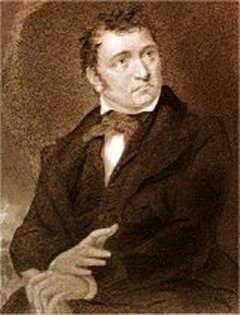

Written by Mary Ferguson
 John Nicholson was born on November 29th 1790 in Weardley in the parish of
Harewood. He was the eldest child of Thomas Nicholson, a man of industrious
habits, who, with slight assistance from his father-in-law, had commenced
business as a worsted wool manufacturer.
John Nicholson was born on November 29th 1790 in Weardley in the parish of
Harewood. He was the eldest child of Thomas Nicholson, a man of industrious
habits, who, with slight assistance from his father-in-law, had commenced
business as a worsted wool manufacturer.
When John was a few weeks old, his family moved from the parish of Harewood to Eldwick, near Bingley. Thomas brought up a large family and provided for a comfortable old age.
As John grew to manhood, he was the exact opposite to his father. The only thing he inherited from his father was a great love of reading the works of Shakespeare, Milton, Byron, Pope and others. These he would read on winter evenings to his family, pointing out the beauties and exalted sentiments and all that poetry could teach in English literature. These poets kindled the flame burning in John's soul and gave him the literary genius that later became the mark of the Airedale Poet.
Nicholson became a wool sorter when he left school. Being of unsettled mind, reading and poetry were allowed to interfere with his work, which is why he remained a woolsorter to the end of his days.
His education at Bingley Grammar School taught him a world of sentiment, because he read nearly all of our English literary works. Alas, there was no method in his intellectual searching, because he did look for any particular branch of study to place him in a higher position in society.
At night, reading affected his health. This caused his mother to hide the candles. Not to be put off, John made a lamp out of an old mustard pot, with a cotton cord twisted into a wick, which he fed with olive oil. In that way he carried on his learning when the family were in bed.
Another thing he was fond of doing in his father's absence: he would creep away from work to wander on the wild moorland or the lovely dells of Eldwick, and read his favourite authors, absolutely lost in the thought that filled his youthful mind.
Eldwick with its low mountain beauty gave much joy and inspiration. In one of his ramblings John carried with him a sharp instrument and scratched his name on the face of a rock in Lower Eldwick. It bears the name of Nicholson's Rock to this day.
It is sad to know that his poems are no longer in print for people to take to read and enjoy. The saddest thing is John Nicholson met a sad and tragic death. On Good Friday, April 13th 1843 he visited his aunt on foot, and on the way there he called at several public houses to refresh his thirst.
The way was long and John became unsteady on his feet. Having to cross the River Aire by stepping-stone, when half way across, he missed his step and fell into the deep part of the river. A half-witted person, hearing his cry for help, took fright and ran away, leaving John to perish. Two hours later, a farm labourer came along and brought his employer to the now fast-sinking poet, and at that moment John Nicholson, the Airedale poet took his last breath and died.
On April 13th 1843, what would have been perhaps another Milton or Byron, John Nicholson was laid to rest in Airedale churchyard, at the age of 53 years. Maybe it is not fair to judge his poetry on the merits of Milton or Byron or the other poets, because he did not have the same chance in life as the greater poets did.
This is one of Nicholson's poems, written to his future wife, Mary.
I was very taken with the musical lilt, which can be found in many of his poems.
Wild the night, my love, my Mary
But, I promised thee to meet.
Winds and rain they sound so dreary
Yet thou listens for my feet.
Dark the woods that lie before me
High the rocks I have to pass
Where the swains and nymphs have seen us
Each one happy with his lass.
Frail the plank across the river
Slippery with a night of rain
One false step, I'm gone forever
Ne'er to meet my love again
Swollen the streams of every fountain
Tractless is the stormy moor
Capped with mist the lofty mountain
Which I have to wander o'er.
Though the winds be cold and dreary
I have promised thee to meet
If I reach my love, my deary
It will make our bliss more sweet
What the rocks or misty mountains
What the darkness of the woods
What the roaring of the fountains
Though the rills be swollen to floods?
What the tractless moor or river
Though some demon should appear
Can these stop me? Oh no, never!
Three short hours will land me there
Then my plaid I'll throw around me
Sing of Mary on the way
Though great danger lies before me
Yet I cannot, will not stay.

+++++